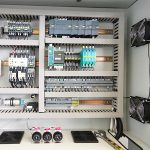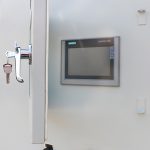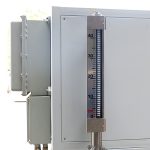Parameters Detailed
| Model | ZLF-35N ZLF-35NS ZLF-35NH ZLF-35NSH | ZLF-50N ZLF-50NS ZLF-50NH ZLF-50NSH | ZLF-80N ZLF-80NS ZLF-80NH ZLF-80NSH | ZLF-125N ZLF-125NS ZLF-125NH ZLF-125NSH | ZLF-200N ZLF-200NS ZLF-200NH ZLF-200NSH |
| Temp. range ℃ | -45~ 250degree (setting the max temp according to the supplier heating or cooling source) -40~135degree(The maximum temperature range can be operated by using glycol water formula.) | ||||
| ZLF- N | The main cold source/or main heat source is used to regulate the flow of the system through proportional regulation system, and control the heat of the clamping of the reaction tank, and a set of heat exchanger for heating or cooling is controlled or cooled. | ||||
| ZLF- NS | Besides ZLF- N function,add one set heater used to reduce high temp. | ||||
| ZLF- NH | Besides ZLF- N function,add electrical heating function | ||||
| ZLF- NSH | Besides ZLF- N function,add one set heater used to reduce high temp and electrical heating function | ||||
| Heat exchanger area | 3.5m2 | 5m2 | 8m2 | 12.5m2 | 20m2 |
| Electric heating function H | 25KW | 35KW | 50KW | 65KW | 80KW |
| With “H” has heating function | |||||
| Control mode | Feed forward PID + Our special dynamic control calculation,LNEYA PLC controller | ||||
| Communication protocol | MODBUS RTU protocol,RS485 interface,optional Ethernet interface/R232 interface | ||||
| Temp control selection | Process temp control | ||||
| Temperature feedback | The temperature of three points: the inlet and outlet of heat-conducting medium, material in reactor(External temperature sensor), PT100 sensor | ||||
| Process temp. feedback | Raw material process feedback:PT100 or 4~20mA or communication given Temp. feedback:PT100 | ||||
| temp feedback: normal PT100 | |||||
| Temperature accuracy | ±1℃ | ±1℃ | ±1℃ | ±1℃ | ±1℃ |
| Circulation pump | 150L/min 2.5BAR | 200L/min 2.5BAR | 400L/min 2.5BAR | 500L/min 2.5BAR | 750L/min 2.5BAR |
| Input and display | 7-inch color touch screen,temperature graph display | ||||
| Safety protection | Self-diagnosis function;freezer overload protection;high pressure switch;overload relay;thermal protection device;liquid low level protection;high temp. Protection and temp. fault protection. | ||||
| Perform valve piece | Electric proportional control valve, control signal 4~20mA. | ||||
| Piping material | SUS304 | ||||
| Connection size | DN40 | DN40 | DN-50 | DN-65 | DN-80 |
| Dimension cm | 150*120*185 | 180*120*210 | 180*120*210 | 225*120*240 | 225*120*240 |
| Power AC380V50HZ | 2.3kw(max) | 3.5kw(max) | 4.5kw(max) | 8kw(max) | 10.5kw(max) |
| With H power AC380V 50HZ | 27.3kw(max) | 38.5kw(max) | 54.5kw(max) | 73kw(max) | 90.5kw(max) |
| Case material | SUS 304 | SUS 304 | SUS 304 | SUS 304 | SUS304 |
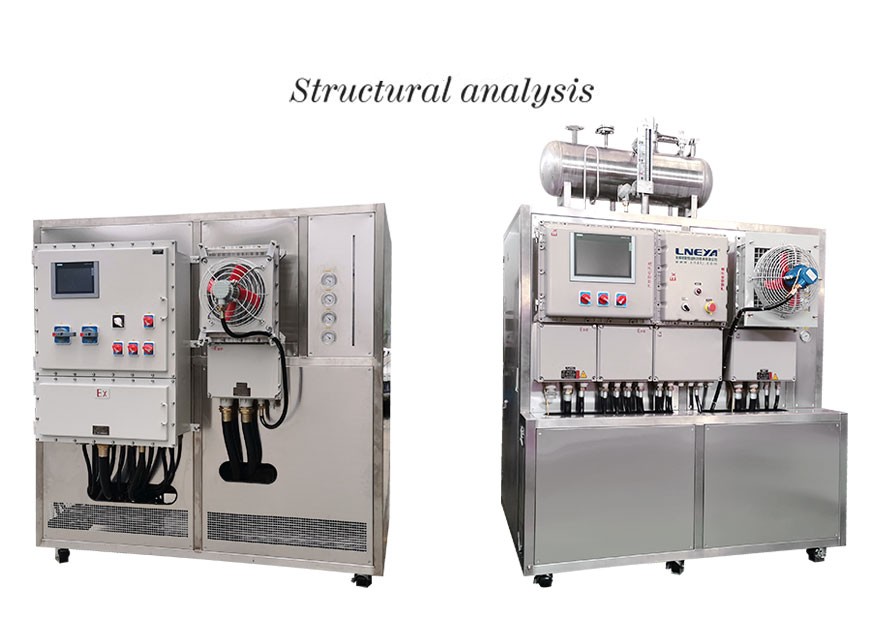
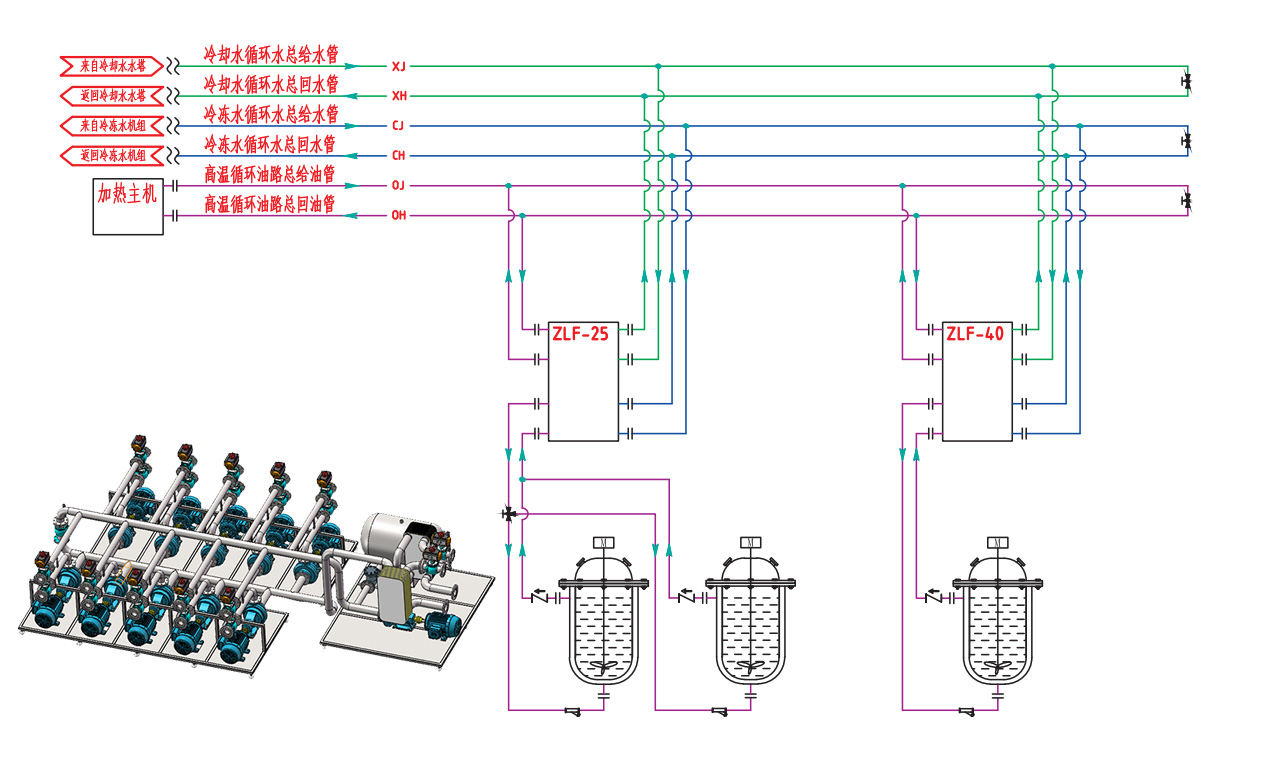
ZLF series Working Principle
TCU temperature control system USES the existing heat (such as steam, cooling water and cryogenic liquid – the “primary”) system infrastructure are integrated into the single fluid system was used to control the temperature of process equipment or in the secondary loop.This achieves only one type of heat transfer liquid can flow into the jacket of the reaction vessel (not directly flow into steam, cooling water or ultra-low temperature liquid).The temperature of the whole reaction process is controlled by operation.

Control the temperature of the reactor material
Through three-point sampling (material temperature point, temperature control system outlet temperature, temperature control system inlet temperature), through our company’s own model-free self-built tree algorithm and general anti-lag cascade algorithm.
ZLF Application

Use area: can be used in various explosion-proof areas
The temperature control unit (TCU) is mainly used in reactor heating, cooling temperature control in fine chemical, chemical pharmaceutical, and biopharmaceutical processes. It can realize automatic control of temperature rise, temperature drop, constant temperature and distillation during the reaction process, especially suitable for the reaction process. There is a process control that requires heat and heat.
RELATED PRODUCTS
Switch more- VIEW
SUNDI -100℃~135℃
Heating Power 3.5kW~80kW Cooling capacity 0.45kW~80kW
- VIEW
SUNDI -90℃~250℃
Heating Power 3kW~80kW Cooling capacity 0.2kW~80kW
- VIEW
SUNDI -80℃~250℃
Heating Power 3kW~80kW Cooling capacity 0.3kW~80kW
- VIEW
SUNDI -70℃~250℃
Cooling capacity 0.4kW~15kW Heating Power 2.5kW~15kW
loading…
No more to see
 LNEYA Chillers
LNEYA Chillers




